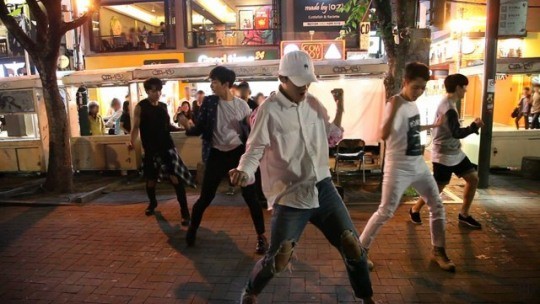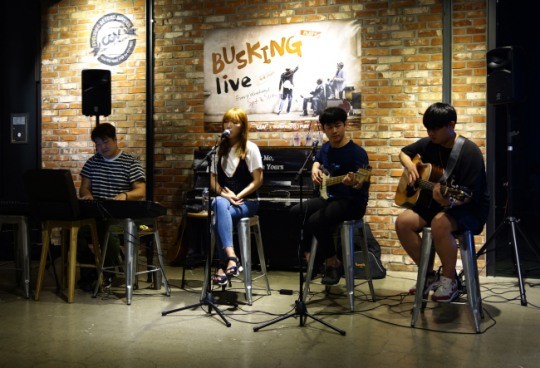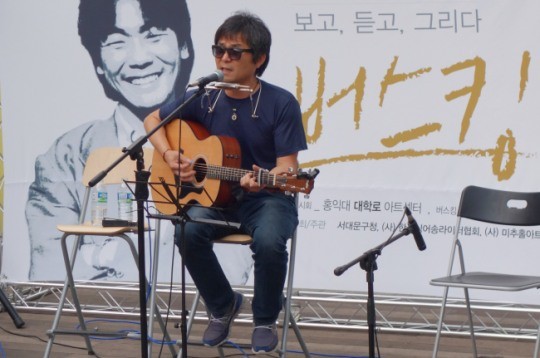|

Boy group B.I.G performs on Sinchon streets on June 5. (GH Entertainment)
While the tradition of busking -- performing music outdoors for passersby -- is appreciated as a spontaneous display of creativity unique to indie musicians, a growing number of K-pop groups are straying from the confines of their scrupulously set stages to roam the streets.
Live outdoor performances allow management-led singers to show off their talents, display a more carefree side, stripped of K-pop’s notoriously choreographed stage sequences, and bond with the crowd. In addition, with live streaming, busking performances are no longer limited to the audience present at a specific time and space. This makes for cost-efficient yet wide-reaching promotional clips, a major reason for busking quickly becoming a favorite medium for debuting K-pop artists.
Several K-pop groups have taken to the streets this summer already. In early June, ballad duo Take was spotted belting out soulful tunes in Sinchon, while girl group SUS4, which debuted last year, drew a crowd of some 300 in Hongdae, according to reports. Singer Song Yoo-bin, a contestant from singing competition program “Superstar K,” has been putting on numerous shows on the streets in Sinchon, singing both his own music and covers of popular K-pop tunes.
“We wanted to present different charms and musical skills that haven’t been seen on air,” said GH Entertainment, the agency of boy group B.I.G, which showcased a dance routine near Sinchon Subway Station on June 5.
According to entertainment agency Star Empire, home to girl group trainees Han Hye-ri, Kang Si-hyeon and Kim Yoon-ji, busking is “the easiest and quickest way to reach people directly” and “interact with them up close.” The three girls, contestants on singing audition program “Produce 101,” did not make it to the finals and are now preparing to debut in a group of their own. Their afternoon Hongdae performance on June 5 kicked off their promotional campaign, and was watched by over 100,000 viewers on the Naver’s live-streaming app V.
Busking to a plan
 Indie band Uhikooya performs at a busking station set up inside CGV cinema in Yeouido on Sunday afternoon. (Rumy Doo/The Korea Herald)
Some indie musicians worry that the streets, previously the exclusive territory of struggling artists seeking to let their creative juices flow, are turning into outlets for mass advertisement. And with the advent of apps like Busking Play that provide busking schedules, the creation of busking zones in movie theaters like CGV and city government-led initiatives to foster street artists, some worry that the days of the free-spirited troubadour are over.
“It seems more like a mini-concert,” said a spectator surnamed Lee, who was waiting with her husband and two children for the movie “Jungle Book” to start, at a scheduled performance by indie band Uhikooya on Sunday afternoon at CGV’s Busking Zone, a miniature stage the cinema has set aside for aspiring musicians.
“It’s not like in the movies, where you see musicians in alleyways singing with an open guitar case in front of them,” said Lee, pointing to the musical equipment provided by the cinema chain.
According to Uhikooya vocalist Lee Ha-yoon, 24, the streets are no longer open to everyone. “There are a lot of obstacles to becoming a busking musician these days,” she said.
The app Busking Play, for example, requires a “really complicated process to register,” said Lee. Applicants need to attach their Facebook page, YouTube clips and other evidence of musical activities before they are allowed to upload their busking schedules on the app’s open platform.
The city government is also jumping into street music. Seodaemun-gu Office, which oversees the Sinchon area, conducts auditions for street artists that it supports by providing busking spaces and a 300,000 won ($250) stipend. In March, Seoul Metro gave a select group of 45 artist teams permission to perform on stages in subway stations. Last week, Goyang in Gyeonggi Province announced it would be recruiting indie artists to perform at the Ilsan Lake Park with the aim of “stimulating the arts” and “promoting tourism.”
“The artists that are picked through that screening process tend to get priority,” said Lee. “There have been times when our band was playing at a park and we were asked to leave because the space was reserved by a (Seodaemun-gu Office-registered) group.”
 A busker performs on Sunday evening on an outdoor stage in Sinchon set up by the Seodaemun-gu Office for musicians paying tribute to the late singer Kim Kwang-seok. (Rumy Doo/The Korea Herald)
Other indie groups are just grateful they’re given a place to share their music.
“These days, there are bands that pay to perform at venues, instead of getting paid,” said singer-songwriter Seo Soo-jung of band the Flower I Saw That Day. “We’re just happy there are places where we can play.”
Still others say it is necessary for busking to be contained to certain areas and limited to qualified groups in a city as densely populated as Seoul, where noise pollution travels easily.
“Technically, all outdoor performances need to be preapproved by the city authorities,” said an official who works at Sinchon Play Bus, a small bus-shaped box run by Seodaemun-gu and which loans equipment to buskers in the area. “But we turn a blind eye to (busking) in areas like Sinchon. Even here, there is an increasing number of complaints from nearby residents and shop owners.”
By Rumy Doo (doo@heraldcorp.com) From old times, I have known that there are many bands perfoming on the streets, but I surprised that even big entertainments lead their singers like idol performing on the streets. Especially, I was amazed that some apprentice singers from produce 101 would have a showcase by street performances. However, it's regrettable that it's difficult to peform on the streets as time goes by. Later, if I get a chance to go famous Seoul's streets, I want to see them singing or dancing on the streets.
|



